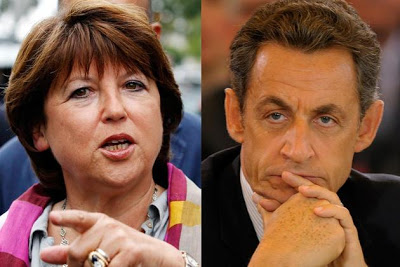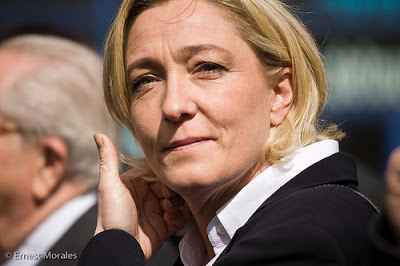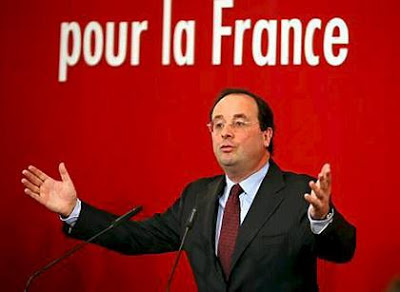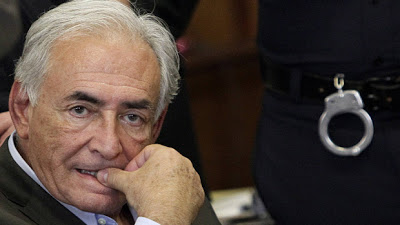Letters from France VI:
The French presidential election of 2012
Sarkozy won in 2007 over a weak PS candidate, Sègoléne Royal, but his politics don’t reflect those of the majority of French voters…
By David P. Hamilton / The Rag Blog / July 6, 2011
[This is the sixth in a series of dispatches from France by The Rag Blog‘s David P. Hamilton.]
PARIS — In 2012, there will be a presidential election that offers at least some hope and opportunity for the left, the one that takes place next spring in France.
The president of France is elected every five years. Conservative Nicolas Sarkozy was elected in 2007 and will stand for reelection in 2012. Given the conservative Sarkozy’s persistent unpopularity, he’ll probably lose to the candidate of the Parti Socialiste (PS) and we will have the first socialist president in France since 1995 and only the second since the founding of the Fifth Republic 53 years ago.
And there is a good chance it will be the first woman president of France as well.
French presidential elections are fundamentally different from American presidential elections. They are largely publicly-funded and tightly regulated. Compared to U.S. federal elections, those in France are qualitatively less corrupted by corporate financing. Corporate contributions to political candidates or parties were prohibited in 1992 during the presidency of Francois Mitterrand, the only previous PS president. A study by the U.S. Library of Congress states,
The intent of the [French] Parliament was to cut any link between the economic world and the political world. To compensate for this loss of funding, it sensibly increased public funding.
Unlike in the U.S., French campaign expenditures are capped. That cap was roughly $32 million in 2007 for the two candidates making it into the second round finals. Obama plans to spend $1 billion getting reelected in 2012 and Republicans will try to match him.
In France, personal campaign contributions are capped at $6,300. All candidates are given free and equal TV time and they can’t buy more. This is not to say that no one cheats or that corporations still don’t have undue influence, but the official rules are profoundly better than those in the U.S. In France the government is not a wholly owned subsidiary of the mega-corporate hegemony and democracy still has a chance.
French presidential elections involve two rounds of voting, two weeks apart. To maximize participation, the elections take place on Sundays, not Tuesdays — a work day — as in the U.S. The first round in 2012 takes place next April 22. In it, candidates from many parties will run.
To qualify for a position on the ballot, a candidate must gather the signatures of 500 elected representatives in at least 30 (of 95) different French departments. This doesn’t seem to be a great obstacle. In the 2007 election, there were 11 candidates in the first round. The nine representing parties other than the two main parties won 43% of the first round votes. In 2002, there were 16 parties in the first round and the 14 smaller parties garnered over 63%.
In that year, the candidate of the far-right Front Nationale (FN), Jean Marie Le Pen, made it into the second round run off with only 17% of the first round vote, barely beating out the PS candidate. This was the result of the left vote being split among seven different parties, with parties to the left of the PS receiving 21% of the first round vote.
Le Pen was crushed in the second round by the candidate of the center-rightist Union pour un Mouvement Populaire (UMP), Jacques Chirac, whose vote went from 19% in the first round to 82% in the second, as the entire left was forced to support him in order to avoid the election of a neo-fascist.
The French presidential election would have only one round if someone got over 50% in the first round, but no one has ever come close to doing that. Close to half the electorate identifies with parties other than the two main ones of the center-left and center-right.
The 2012 second round run off takes place on May 6th. The normal and expected result is that the center-right UMP and the center-left PS will get the most votes in the first round and make it into a runoff. That has been the result every election except in 2002. Given voter fear that 2002 might happen again, there is a very strong likelihood that in 2012 the PS and UMP will face off again in the run off.
For many months, polls have shown the current French president, Nicolas Sarkozy of the UMP, with high disapproval ratings, though the most recent polls have showed that his political fortunes have somewhat improved. From a low in April of 20%, Sakozy’s most recent approval ratings have risen to 35%. He has benefited from the demise of Dominique Strauss-Kahn (usually known as DSK) as a candidate due to his arrest in New York and the lack of another PS contender of equal stature.
Sarkozy has also benefited at the expense of Marine Le Pen, who experienced a bubble of popularity when she took over the FN from her father, a bubble that has since receded. Still, Sarkozy’s approval ratings are the lowest of any French president since the beginning of the Fifth Republic in 1958 and lower than when his party was hammered in the regional elections this past March. Even with his recent rise in the polls, Sarkozy’s approval ratings remain 13 and 19% behind his principal PS challengers.
Sakozy’s popularity problems are not a mystery. They derive from the dislike many have for his personality and the fact that his rightist positions are just not very popular with the French public. He is seen as wanting to Americanize France, not a popular notion.
In those recent regional elections, his UMP was beaten badly, maintaining control of just one of France’s 22 regions, a major personal defeat for Sarkozy. Then in June his predecessor as president, the popular Jacques Chirac, also from the UMP, blasted Sarkozy in Chirac’s newly published memoirs as being “unFrench” and temperamentally unsuited to be president.
Sarkozy’s effort to raise the age at which one could begin receiving an old age retirement pension cost him politically. His banning the veil and deporting Roma were seen as efforts to win the anti-immigrant vote from the far right. He has been stained by allegations of political payoffs. His participation in the NATO alliance in Afghanistan is unpopular.
Typical of his missteps is his party’s position on gay marriage. They killed the most recent effort in the National Assembly to allow gay marriage despite polls that showed 63% of the French public supporting it. Their hard line opposition to reform of marijuana laws faces similar popular disapproval. With most of the French public wanting to reduce their dependency on nuclear energy after the disaster in Japan, Sarkozy increased the government’s investment in it.
Sarkozy’s taking the lead in the attack on Qaddafi in Libya was popular at first, but was again seen as an effort to appeal to the far-right supporters of Le Pen and it didn’t substantially improve his low poll numbers. That is now turning sour as well.
Sarkozy won in 2007 over a weak PS candidate, Sègoléne Royal, but his politics don’t reflect those of the majority of French voters, 43% of whom think capitalism is “fundamentally flawed.” Important members of his legislative coalition such as ex-Prime Minister Dominique de Villepin have abandoned him and threatened to run for president against him. Prominent centrists such as Francois Bayrou (Democratic Movement) and Jean-Louis Borloo (Radical Party) may also run against him.
Sarkozy will need lots of help to win. Without everything falling in his favor, the odds are that the next president of France will be from the Parti Socialiste.
The big question is who will be the Parti Socialiste nominee. Six candidates have entered the PS primary to be held in two rounds a week apart in October. Polls show Francois Hollande or Martine Aubry practically tied for the lead and far in front of the other four candidates. Hollande has been campaigning since March and has a slight lead.
Aubry had an agreement with DSK not to run against him. She didn’t enter the race until June when it became apparent DSK was out. She has closed the gap and now is running a close second to Hollande. Hollande was the leader of the Socialist Party from 1997 to 2008. Aubry has been the leader since 2008. There is not a great deal of political difference between them. Although Aubry is considered somewhat to Hollande’s left, both are within the mainstream of the PS.
Until his May 5 arrest in New York, Dominique Strauss-Kahn was the prohibitive favorite to be the next president, running as the nominee of the Parti Socialiste. A late April poll showed him 22% ahead of Sarkozy in a run off. The same poll showed Holland beating Sarkozy by 12% and Aubry beating him by 10%.
DSK will likely have the charges against him in New York dropped or reduced, but other accusations of sexual misconduct await him in France. He cannot return to the presidential race as a candidate in the PS primary, because the deadline to enter it has passed. Although he could still run as an independent if his legal troubles end soon, a big majority of the French public no longer wants him as a candidate.
Actually, it is a blessing that DSK is out of the race, great for the Parti Socialiste and for France. DSK is hardly a socialist. He is credited by economist Joseph Stiglitz with having made important reforms at the IMF, but that accolade has proven controversial on the left. However, it is beyond question that DSK headed an institution designed to facilitate the smooth functioning of international capitalism.
His opulent life style and proclivity to hang out with the elite of the international capitalist ruling class showed little evidence that he had much connection with the desires and needs of mere workers. Besides that, he is by far the strongest supporter of Israel among the PS leadership. The PS favored him because he looked like a sure winner. Now they have a renewed opportunity to nominate an actual socialist.
Francois Hollande is the leading candidate for the PS nomination. Besides being First Secretary of the Socialist Party for over 10 years, he is best known for being the partner of Sègoléne Royal, the PS’s losing candidate for president in 2007. Although never married, Hollande and Royal were together for 28 years and have four children.
Royal threw him out just after her 2007 election loss when his affair during the campaign with a French journalist was revealed. Typically, this private peccadillo has been shrugged off by the electorate, but after the DSK affair, the private life of candidates is increasingly seen as worthy of public scrutiny in France.
Sègoléne Royal was seen as a caviar-socialist and lightweight. She lost to Sarkozy by 6%. Then in 2008 she narrowly lost the race for First Secretary of the PS to Aubry. Royal is now running a distant third among candidates for the 2012 PS nomination.
Despite the loss of their majority in the National Assembly by the “plural left” (the PS and its leftwing allies) in 2002 while Hollande was its leader, he was reelected First Secretary of the PS in 2003 “against the leftwing of the party.” In 2005, Hollande advocated PS support for the adoption of the European Constitution in the French referendum. The left of the PS and the Communists opposed the constitution on the basis that it primarily supported capitalist interests.
In a great victory for the left, the vote to endorse the constitution failed in France and that spelled its doom. The fight over the EU Constitution split the PS and sent the party into disarray. Hollande was on the right in that split.
Hollande is seen as lacking charisma, but he seems to relish that characterization. He has promised to be a “normal” president after the upheavals and controversies that have characterized the Sarkozy government. Some of his support stems from his ability to lose over 10 kilograms of weight in preparation to run for president. He seems to promise stability, respectability and minimal change, but with mildly socialist PS leadership.
He narrowly leads in polls among probable participants in the PS primary and among the general public, but he’s been campaigning three months longer than Aubry. Hollande now faces charges that he helped cover up previous sexual transgressions by DSK while First Secretary of the PS. He identifies himself as a practicing Roman Catholic although PS orthodoxy has long favored secularism. It is fair to say that he represents the right wing of the PS, a party whose dedication to socialism has been widely questioned.
Martine Aubry has an impeccable Parti Socialiste pedigree. She is the current First Secretary of the party and the mayor of the northern industrial city of Lille. She was a Minister in two previous PS governments: Minister of Labor from 1991 to 1993 and of Social Affairs from 1997 to 2000.
She is best known as the author of the controversial measure reducing the workweek from 39 to 35 hours. She also introduced a universal healthcare provision that gave full coverage to the poorest families. In 1986, she founded the anti-racist Act Against Exclusion Foundation. She has been mayor of Lille since 2001 and won the 2008 mayoral election with 67% of the vote. She is described as tough and demanding. She responds that “I am up-front and not a hypocrite. I am much less hard than many politicians. I may even be too sensitive.”
Aubry is the best hope of the left. Her election would more likely lead to greater changes in France and in the European Union than if Hollande wins. In addition, Aubry’s victory would be a historic triumph for feminism in France. Aubry’s record on gender equality is unassailable. But many of my left-leaning Paris friends, female and male, referred to her disparagingly as a “bulldog” whom they can’t stand.
This points to two unfortunate problems for her candidacy. First, she will have to overcome the sexism reflected in such remarks. Second, she is not glamorous and chic. Like Sarkozy, her personality is not especially winning. Many French prefer their president to exhibit those personal qualities, regardless of their politics. She probably wouldn’t win a “beauty contest” election, but her image advisors are trying to soften her edges. She is identified as a lapsed Roman Catholic although her father famously broke the barrier against a practicing Roman Catholic being a leader of the PS.
Jacques Delors, Aubry’s father, is a Parti Socialiste icon who was the Finance Minister under Francois Mitterrand (1981-85) and President of the European Commission (1985 – 95). As Finance Minister, he advocated a pause in the extension of the welfare state and the acceptance of the market economy.
He was expected to be the PS presidential candidate in 1994, but turned it down “due to the radicalization of the party which prevented his centrist strategy.” His daughter is considered to be closer to the left wing of the party. That will likely help her in the Socialist Party primary and, if she wins that, in the first round of the presidential election. Delors is supporting his daughter’s candidacy, as is Paris’ popular gay mayor, Bertrand Delanoe.
It was under Aubry’s leadership that the PS changed the rules for its primary election. Historically, only card-carrying members of the party voted to choose their presidential candidate. Now, any French citizen with “sympathies for the left” is entitled to vote in their primary. This will be the case for the first time this year and although what effect it will have is unclear, it is expected to help the left. Polls show that as many as a third of the general public might participate in the PS primary.
Although Hollande polls slightly ahead of Aubry at this time, with six candidates in the race, he doesn’t have enough support to win the PS primary without a runoff. Aubry’s campaign is newer and may not have reached its potential. She may benefit from a growing feminist backlash against the sexism in French politics in the wake of the DSK scandal. As such, she would become the vehicle for the aspirations of French feminists. She would be the first woman to be president of France.
The uncertainties related to the new format of the PS primary — and who among the first round losers would endorse whom in the runoff — provide enough variables to make the likely PS nominee unclear. But it will either be Francois Hollande or Martine Aubry. Sègoléne Royal is running a distant third and is probably out of serious contention. Given her personal history with Hollande, it will be fascinating to hear her second round endorsement.
Hollande and Aubry are graduates of both the prestigious Ecole National de Administration and the Paris Institute of Political Studies. Having attended these schools has been considered virtually a requirement for holding high public office in France. Two-thirds of the CEO’s of major French corporations are graduates of the ENA.
Aubry has been a professor at the ENA and, unlike Hollande, has numerous publications to her credit. Titles of publications she has written include “A Guide for Struggle Against the Extreme Right” (1995), “What is Solidarity?” (2002), “Culture Always and More Than Ever” (2004), “A Vision for Hope, A Will to Transform” (2004), and “Take Action Against Discrimination.” (2006). There is some prejudice against “ENAques” as an elite who have long dominated both French politics and business. Sarkozy is not an “enaque.”
There is a possibility that Marine Le Pen, candidate of the far right Front Nationale (FN), will make the presidential runoff in 2012. She could edge out the PS candidate as her father did in 2002, but it is more likely she would eliminate Sarkozy in the first round. If so, she will lose badly to whoever opposes her in the run off, just as her father did in 2002.
It is the dream of both Sarkozy and the PS nominee, that Le Pen will make the runoff and eliminate their more centrist opponent. There is some possibility of that happening. Polls earlier this year showed Le Pen’s popularity rising, but it has since declined. She has distanced herself from some of her father’s more disreputable positions (e.g., anti-Semitism) and endorsed a more “populist” agenda that conforms in some respects to that of the far left.
Still, the FN cannot win and probably cannot get over 30% of the vote in any runoff regardless of who is the opposition. Given the experience of 2002, which few would want to repeat, the left is more likely to support the PS candidate rather than voting for one of the smaller, further left parties in the first round. And the right is more likely to support Sarkozy of the UMP in the first round rather voting for the FN.
For what it’s worth, the newly adopted platform of the PS emphasizes economic development, aid to small businesses and to youth. High on its list of initiatives is the creation of a public investment bank to help small and medium sized businesses. The PS wants to lower taxes for businesses that reinvest profits and raise taxes on those that pay out profits in dividends to stockholders. They also propose to create 30,000 new jobs for youths in green industries and social services.
Their other proposals include higher import duties on products coming from countries that do not respect international social, sanitary, and environmental norms; lower taxes on non-polluting products; allowing gay marriage and adoptions; a reduction of reliance on nuclear energy; and reestablishing the minimum retirement age at 60.
If the PS candidate is likely to be the next president, regardless of who that candidate is, what might we expect from that candidate as president? There are a couple of major variables. Will the winning PS candidate be Hollande or Aubry? The consensus is that she is to his left, although they have had some difficulty articulating their differences in the campaign so far. My reading is that the differences between them could be significant.
Another major variable in play is whether there will be a PS or “plural left” majority in the National Assembly or will there be another round of “cohabitation”? With “cohabitation” you have the presidency in the hands of one party and the legislature in the hands of another, a divided government where little gets accomplished. Right now the UMP has a large majority in the legislature, but it did poorly in recent regional elections. The PS is expected to make advances, but will it be enough to take control of the legislature? No one knows.
Regardless, the hypothetical PS president would at least slow Sarkozy’s privatizations and blunt attacks on the reforms and benefit programs won by past left-led governments. But don’t expect the burst of nationalizations and other more radical measures that characterized the beginning of the last PS presidency, Francois Mitterrand in 1981, even if the PS wins the presidency and control of the National Assembly. In general, a new PS president would protect and refine benefits and socialist programs that already exist, such as the world’s best health care system, instead of presenting broad new initiatives.
What could a PS presidency mean in a EU context? If the PS is able to form a governing majority in the legislature, they will name the Prime Minister and his/her cabinet. In that case the key figure could be DSK, a strong candidate to be the future Finance Minister regardless of which PS candidate wins, provided he’s not in jail.
In the ongoing Euro debt crisis, onerous austerity measures, privatizations, and cuts in government spending have been forced upon Greece and others, typical of the pre-DSK approach at the IMF, an approach now widely rejected by potential recipient countries. DSK would be expected to reorient France’s approach to the Euro debt crisis in a manner similar to the changes he made at the IMF.
In praising DSK’s tenure there, liberal Nobel Laureate economist Joseph Stiglitz recently characterized those changes as “the link the IMF has finally drawn between inequality and instability”. Stiglitz goes on to quote DSK’s speech to the Brookings Institute earlier this year where DSK concluded, “Ultimately, employment and equity are the building blocks of economic stability and prosperity, of political stability and peace… It must be at the heart of our agenda.”
The election of a PS president in France is not the revolution. Besides, France has had four revolutions since we had ours. It’s our turn. But as the conservative Jacques Chirac demonstrated at the beginning of the Iraq War, it is sometimes helpful to have nominal friends in high places — like the Èlysée Palace.
[David P. Hamilton has been a political activist in Austin since the late 1960s when he worked with SDS and wrote for The Rag, Austin’s underground newspaper. Read more articles by David P. Hamilton on The Rag Blog.]





















